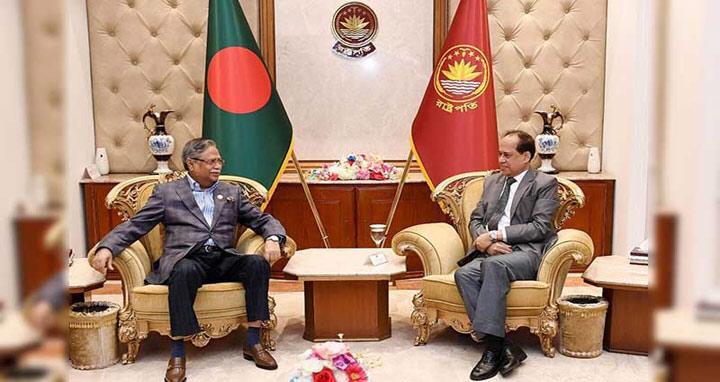At around 4 in the morning of November 4, a seven-member of team of American officials from varied professional backgrounds checked into a five-star hotel in the upmarket Gulshan neighbourhood of Dhaka.
Two other junior-level Americans, who accompanied the main team as “helpers”, checked into a nearby smaller hotel.
The team’s visit takes place at a time when Peter D Haas, the American ambassador in Dhaka, is scheduled to visit New Delhi to be part of closed door confabulations between top Indian external affairs and security officials, US Secretary of State Anthony Blinken, Defence Secretary Lloyd Austin, Donald Lu, Assistant Secretary at the State Deparment’s Bureau of South and Central Asian Affairs.
Haas recently took a “break” from Bangladesh for a couple of days when he was away on a Nepal visit.
The meeting will likely discuss the future course of action in election-bound Bangladesh where the US and India are heavily invested.
This meeting will take place on the sidelines of the US-India ‘2+2’ Dialogue that is related to both countries’ policy objectives in the Indo-Pacific region.
Led by a lady official, who works in a senior position in the US Department of Justice’s Asia-Pacific division and has a strong legal background, the team’s visit is said to be part of an investigation into the violent events on Dhaka’s streets on October 28.
Northeast News possesses the identity details of the team members but is withholding them in the interest of the security of the visiting officials. This team is scheduled to return to the US on November 14.
That day, hundreds of thousands of supporters of three large political parties gathered in display of a show of strength ahead of the Bangladesh’s general elections scheduled to be held in early January 2024.
The widespread violence and arson, allegedly indulged in by Awami League supporters and a section of the police, caused mayhem and led to the death of four persons, including a policeman.
This American team, according to sources, will examine the circumstances that led to the violence. The team members will interact with US embassy officials in a bid to find evidence related to findings by international human rights organisations which had earlier characterised the violence as an outcome of an orchestrated move by the Dhaka Metropolitan Police and other law enforcement agencies acting in tandem with Awami League supporters.
It is not known whether the team will share the investigation report with diplomats of the US embassy in Dhaka or with the Justice Department, but it could form the basis of any punitive move against the Bangladesh police and other law enforcement agencies.
Northeast News had reported on October 29 that sanctions similar to the types that were used against Bangladesh’s infamous Rapid Action Battalion (RAB) – targeted at individual officers and collectively as an organisation – could be employed against the police in general and some of its senior management-level officers for their alleged involvement in the October 28 violence in particular.
It is likely that the Justice Department official-led US team, besides investigating the circumstances leading to the October 28 violence, will take an overview of the election process and the official declaration of the tafseel by the Bangladesh Election Commission (BEC).
Chief Election Commissioner Kazi Habibul Awal met President Mohammad Shahbuddin this afternoon.
The sources added that while the tafseel (election notification) is key to the US’ future course of action, punitive measures could also hit the BEC in the event it goes ahead with the poll process.
The steps against the BEC, if and when they are taken, will be sought to be justified by the poll panel’s real or perceived failure to create a conducive atmosphere for holding the elections.
Meanwhile, the United Nations Human Rights Office of the High Commissioner on November 8 said that “Bangladesh’s human rights record will be examined by the United Nations Human Rights Council’s Universal Periodic Review (UPR) Working Group for the fourth time on Monday, 13 November 2023, in a meeting in Geneva”.
This will be webcast live, the UNHROCH’s office said, adding that “Bangladesh’s first, second and third UPR reviews took place in February 2009, April 2013, and May 2018, respectively.















